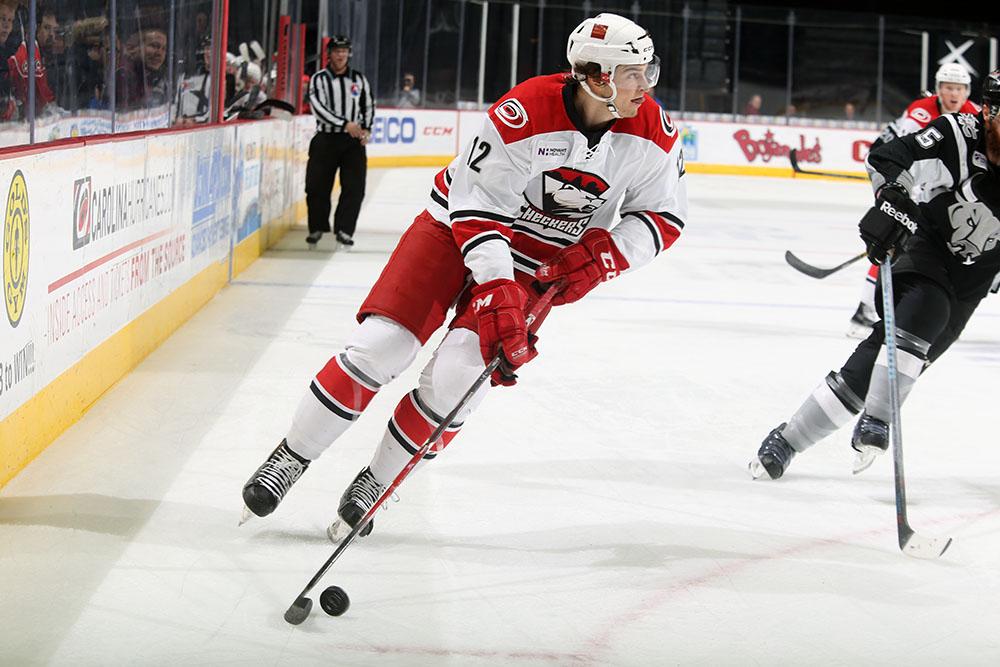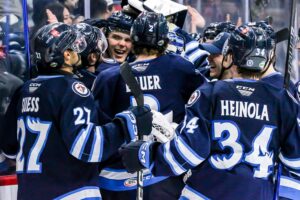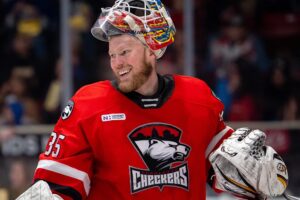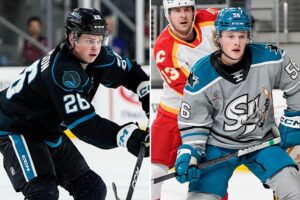by Paul Branecky | AHL On The Beat Archive
In the infamously small world of the sport of hockey, it’s not unusual to come across second-generation pros. It is unusual to have as many as the Charlotte Checkers do now.
Five members of this season’s team – Patrick Brown, Keegan Lowe, Carter Sandlak, Brody Sutter, and Brendan Woods – are following in the footsteps of their fathers, who all played some degree of professional hockey. Most of them are still involved in one way or another, and all have had a profound influence on their sons.
With that being the case, it’s perhaps not surprising that the Checkers, despite not having the most talented roster of their five AHL seasons, have rarely had their work ethiccalled into question. Their current coach appreciates that aspect of their presence, but does not always appreciate the way they make him feel.
“As a coach, it means you’re getting old,” said Jeff Daniels. “The guys you used to play with or against, all of the sudden their sons are playing. It’s a small world, and time flies.”
Despite having that common bond, the Checkers’ sons had very different experiences and upbringings. Whether their dads were playing or coaching, it usually meant growing up in several different places.
“We moved quite a bit,” said Woods, whose father, Bob, the current head coach of the WHL’s Saskatoon Blades, played for 10 different ECHL, AHL, IHL and European teams and has coached for five more during Brendan’s lifetime. “I lived in Vienna, Austria, the states, and then Canada. I’ve probably lived in 15 different states. It was crazy. You can kind of compare it to a military family."
One might picture Brody Sutter, whose father, Duane, and five uncles all played in the NHL, to have grown up on the famous family homestead of Viking, Alberta. He did not.
“I lived in Florida for 10 years from age three to 13,” said Sutter, whose dad is now a pro scout with the Edmonton Oilers. “We were fortunate where we didn’t have to move around much because my dad was with the Panthers for 10 to 12 years. As a family we were lucky."
Sandlak’s journey started earlier than the rest. As early as humanly possible, in fact.
“The day I was born he got traded to Hartford,” said Sandlak of his father, Jim, who was playing for the Vancouver Canucks at the time. “I was almost American.”
Among other nationalities.
“Me and my brother only ate those salted pretzels,” he said of his year spent as a 6-year-old in Ingolstadt, Germany, where Jim, now an amateur scout with the Anaheim Ducks, played. “We’d sit in front of the TV and watch Sesame Street in German."
The other two spent their formative years closer to home in areas where hockey was more of a traditional pastime. Brown doesn’t recall much about his father Doug’s stints in New Jersey and Pittsburgh during his lifetime but has plenty of fond memories of the next several years in Detroit.
“When he won the cups (in 1997 and 1998) I got to go on the ice and he skated around with me and my sister on his shoulders, which was cool,” he said.
Lowe was still an infant when Kevin Lowe, the Oilers’ current president of hockey operations, won the last of his six Stanley Cups with the New York Rangers in 1994. Still, he has bragging rights. He thinks.
“I’m almost 100 percent sure I was sitting in the top of that thing,” said Keegan, referring, of course, to the Stanley Cup. “I think they’re kind of skeptical about telling me because of the whole, ‘Don’t touch it before you win it’ rule, but it wasn’t under my power so I don’t think that counts.”
Aside from those first few years spent in the New York area – despite being a self-described “big Canadian,” his birthplace is Greenwich, Connecticut – Lowe had the most stable upbringing in terms of being able to spend most of his life in the area his family has called home since Kevin’s rookie year in 1979. Still, as the only general manager’s son of the Checkers’ second generation, he had some unique experiences.
“I’ve faced basically everything you can think of, good and bad, in growing up in a hockey-crazy city like Edmonton,” said Keegan Lowe. “Every good decision, the fans loved and were happy to see me if they recognized me. If the team struggled, I’d get the odd dirty look at a rink and stuff like that. Nothing against the fans in Edmonton – they’re amazing hockey fans, but it’s just the way it is.”
Despite his dad’s position, Lowe describes himself as having just been another die-hard Oilers fan among his peers, never asking Kevin for inside information even though his friends at school were sure he had the scoops on lineup decisions and potential trades. That occasionally made for some tricky situations.
"I remember coming home from school, and obviously my dad was still at the office,” said Lowe of the 2007 trade deadline. “My mom was a little upset like something had happened. I asked her, and she told me that they had to trade Ryan Smyth. My dad had told her to tell us before we found out on the news because we were all big Ryan Smyth fans, me especially. He’s a tremendous guy, not just as a player but as the perfect role model you could have.”
The whole community found that one tough to swallow, particularly when a teary-eyed Smyth said his goodbyes at a subsequent press conference. Still, the decision was sound from a hockey standpoint and Keegan, despite his personal feelings, never questioned it.
“Like anyone, I’ve always looked up to my dad,” he said. “He was a god to me and always has been, so I knew what he did had to be done. I always knew what he was doing was right and supported every decision he made.”
All five players still carry that admiration and respect for their fathers, who all still take a keen interest and role in developing their sons to be the best they can be. Doug Brown is the only dad who isn’t actively working in pro hockey but certainly has enough experience to be of use.
“I use this line a lot, but it’s like having my own personal coach,” said Patrick Brown. “After every game you hear from your teammates and your coaches, and then you get to talk to your dad and see what he thought. It’s another point of view, and he sees a lot of things that other people don’t see and he lets me know.
“He coached me my whole life until high school, and some of the things we did, we did them at eight years old and you don’t see them again until you get to the pro level. He helps me develop a lot in the summers when we work one-on-one with him and my little brother (Chris Brown, a Buffalo Sabres prospect). He’s the one who first started taking me to the gym when I was 15 years old, and that helped me a lot.”
The Checkers’ second generation catches up with the first whenever possible, often on the phone after games when schedules allow. If a dad happened to watch the game, those conversations can sometimes be quite honest.
“He’s way too honest,” said Sandlak with a laugh.
“He never sugarcoats anything,” said Sutter. “To this day he lets me know when I play well and he lets me know when I play bad, and that’s what I want. I don’t need someone in my corner telling me I’m playing good every night when I know I’m not.”
“At times I didn’t really want to hear what he had to say because I knew he was always right, but whenever I had questions and stuff I knew I could go right to him and he’d give me the same answers as the coach on my team,” said Woods.
Kevin Lowe’s approach is seemingly among the more laid-back.
“My dad was never a guy who, when we’d get in the car after a game, would scold me out for a play I’d made,” said Keegan. “He’d smile and ask me if I had fun, and then we’d talk about the game if I brought it up. In junior, if there was something that stuck out in my game he’d wait until the next day at dinnertime. Then, he’d line up the salt and pepper shakers like players and he’d go over it.”
As for how their upbringings translate to their own careers, all five admitted that most things have to be learned firsthand. However, there does seem to be an initial advantage when making the transition to the pros.
“They’ve been around,” said Daniels. “At their first training camp, excited as they are, I’m sure they’ve had their dad talk to them about it or have maybe even gone to a training camp to watch their dad play. You notice that comfort level. At the main training camp when they’re sitting next to an Eric Staal or something like that, those guys have probably sat with Denis Potvin or someone like that when their dad played.”
To be sure, they’re all familiar with the locker room, with stories ranging from eating all the gum (Brown) to being pushed around in shopping carts (Sandlak) to playing hot wheels in the players’ lounge (Lowe). It’s something that may have taken them a few years to appreciate as they realized not every kid got to do those things in their spare time, but those are memories they’d never trade away now.
“When I was younger I knew it was pretty sweet, but when I was older I realized how hard it is to win the Stanley Cup,” said Brown. “For him to have done it twice is pretty cool.”
“At one point I kind of stepped back and realized how lucky I was and not to take things like that for granted,” said Lowe. “Growing up around the game is an unbelievable thing, especially when it’s the game you love and something you want to do the rest of your life.”






































